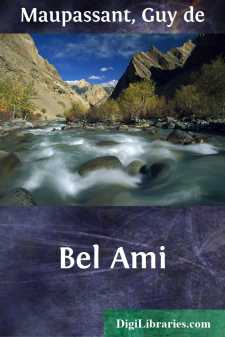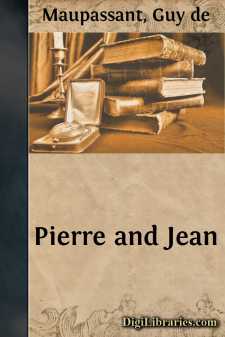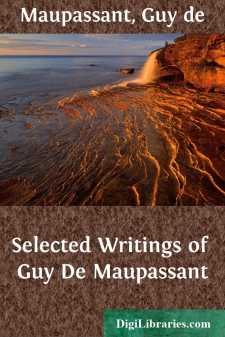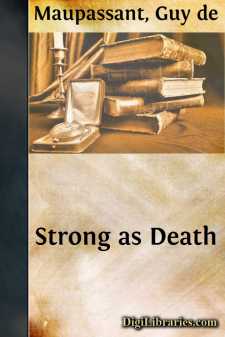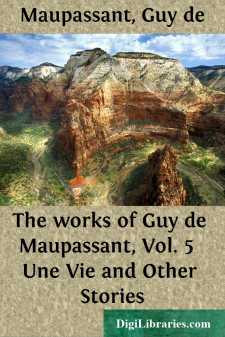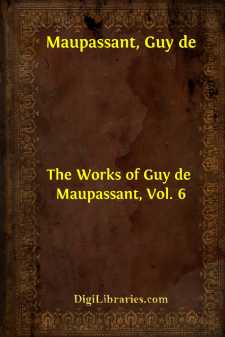Categories
- Antiques & Collectibles 13
- Architecture 36
- Art 48
- Bibles 22
- Biography & Autobiography 813
- Body, Mind & Spirit 142
- Business & Economics 28
- Children's Books 15
- Children's Fiction 12
- Computers 4
- Cooking 94
- Crafts & Hobbies 4
- Drama 346
- Education 46
- Family & Relationships 57
- Fiction 11829
- Games 19
- Gardening 17
- Health & Fitness 34
- History 1377
- House & Home 1
- Humor 147
- Juvenile Fiction 1873
- Juvenile Nonfiction 202
- Language Arts & Disciplines 88
- Law 16
- Literary Collections 686
- Literary Criticism 179
- Mathematics 13
- Medical 41
- Music 40
- Nature 179
- Non-Classifiable 1768
- Performing Arts 7
- Periodicals 1453
- Philosophy 64
- Photography 2
- Poetry 896
- Political Science 203
- Psychology 42
- Reference 154
- Religion 513
- Science 126
- Self-Help 84
- Social Science 81
- Sports & Recreation 34
- Study Aids 3
- Technology & Engineering 59
- Transportation 23
- Travel 463
- True Crime 29
Guy de Maupassant
Guy de Maupassant (1850-1893) was a prolific French writer best known for his short stories, which often depict human nature and the complexities of society with a blend of realism and irony. His most famous works include "The Necklace" and "Boule de Suif," showcasing his keen observation and critique of bourgeois society. Maupassant's literary career was cut short due to mental illness, but he left behind a significant legacy that influenced the short story genre profoundly.
Author's Books:
Sort by:
CHAPTER I. After changing his five-franc piece Georges Duroy left the restaurant. He twisted his mustache in military style and cast a rapid, sweeping glance upon the diners, among whom were three saleswomen, an untidy music-teacher of uncertain age, and two women with their husbands. When he reached the sidewalk, he paused to consider what route he should take. It was the twenty-eighth of June and he...
more...
ACT I. SCENE I. Mme. de Sallus in her drawing-room, seated in a corner by the fireplace. Enter Jacques de RANDOL noiselessly; glances to see that no one is looking, and kisses Mme. de Sallus quickly upon her hair. She starts; utters a faint cry, and turns upon him. MME. DE SALLUS Oh! How imprudent you are! JACQUES DE RANDOL Don't be afraid; no one saw me. MME. DE SALLUS But the servants! JACQUES...
more...
GUY DE MAUPASSANTA STUDY BY POL. NEVEUX"I entered literary life as a meteor, and I shall leave it like a thunderbolt." These words of Maupassant to Jose Maria de Heredia on the occasion of a memorable meeting are, in spite of their morbid solemnity, not an inexact summing up of the brief career during which, for ten years, the writer, by turns undaunted and sorrowful, with the fertility of a...
more...
Guy de Maupassant Guy de Maupassant was born at the Chateau de Miromesnil, near Dieppe, on August 5th, 1850. The Maupassants were an old Lorraine family who had settled in Normandy in the middle of the Eighteenth Century. His father had married in 1846 a young lady of the rich bourgeoisie, Laure Le Poittevin. With her brother Alfred, she had been the playmate of Gustave Flaubert, the son of a Rouen...
more...
CHAPTER I "Tschah!" exclaimed old Roland suddenly, after he had remained motionless for a quarter of an hour, his eyes fixed on the water, while now and again he very slightly lifted his line sunk in the sea. Mme. Roland, dozing in the stern by the side of Mme. Rosemilly, who had been invited to join the fishing-party, woke up, and turning her head to look at her husband, said: "Well, well!...
more...
GUY DE MAUPASSANT Of the French writers of romance of the latter part of the nineteenth century no one made a reputation as quickly as did Guy de Maupassant. Not one has preserved that reputation with more ease, not only during life, but in death. None so completely hides his personality in his glory. In an epoch of the utmost publicity, in which the most insignificant deeds of a celebrated man are...
more...
CHAPTER I A DUEL OF HEARTS Broad daylight streamed down into the vast studio through a skylight in the ceiling, which showed a large square of dazzling blue, a bright vista of limitless heights of azure, across which passed flocks of birds in rapid flight. But the glad light of heaven hardly entered this severe room, with high ceilings and draped walls, before it began to grow soft and dim, to slumber...
more...
The first aim of art, no doubt, is the representation of things as they are. But then things are as our eyes see them and as our minds make them; and it is thus of primary importance for the critic to distinguish the precise qualities of the eyes and minds which make the world into imaginative literature. Reality may be so definite and so false, just as it may be so fantastic and so true; and, among...
more...
The most robust and masculine of recent French novelists is a typical Norman, sprung from an ancient noble family, originally of Lorraine, but long settled in the Pays de Caux. The traveler from England towards Paris, soon after leaving Dieppe, sees on his left hand, immediately beyond the station of St. Aubin, a handsome sixteenth-century house, the Château de Miromesnil, on a hill above the railway....
more...
When the cashier had given him the change out of his five francpiece, George Duroy left the restaurant. As he had a good carriage, both naturally and from his military training, he drew himself up, twirled his moustache, and threw upon the lingering customers a rapid and sweeping glance—one of those glances which take in everything within their range like a casting net. The women looked up at him in...
more...


